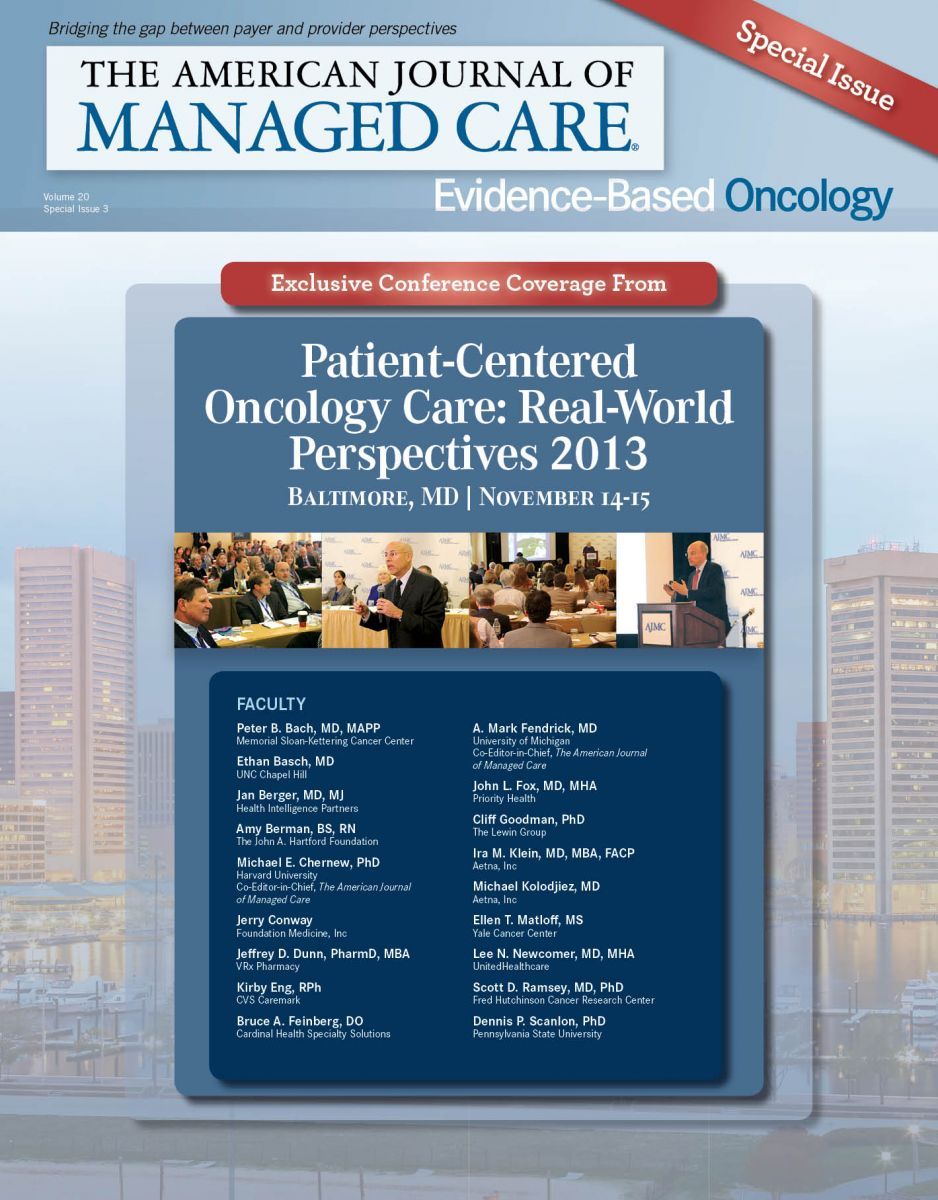- Center on Health Equity & Access
- Clinical
- Health Care Cost
- Health Care Delivery
- Insurance
- Policy
- Technology
- Value-Based Care
Putting the 'Economics' Back Into Health Economics Outcomes Research
From his vantage point as director of the Cancer Technology Assessment Group at the Fred Hutchinson Cancer Research Center in Seattle, Washington, Scott D. Ramsey, MD, PhD,sees the financial fallout of cancer care like few do.
From his vantage point as director of the Cancer Technology Assessment Group at the Fred Hutchinson Cancer Research Center in Seattle, Washington, Scott D. Ramsey, MD, PhD, sees the financial fallout of cancer care like few do. An internist and health economist, Ramsey asserts that the entire approach to clinical trials in recent years has contributed to escalating costs of drugs, and that this trend cannot continue. His talk was titled, “Where Does HEOR Fit in the Oncology Model?”
The connection between economics and healthcare is broken, at least in the United States; so, too, is the pricing model for pharmaceuticals, according to Scott D. Ramsey, MD, PhD. He began his talk by describing the futility of even trying to find a good definition of health economics outcomes research (HEOR) in the literature; in his view, clinical research has had an increasingly narrow focus on whether new cancer drugs produce a short-term benefit, with little regard paid to whether that benefit is worth it financially. This must end, he said.
“Unless we look at value, unless we look at cost, the outcomes research (OR) is somewhat pointless, because we’re not going to be able to make good decisions and improve value for our patients until we take cost into account, and what we get for what we pay,” Ramsey said.
Ramsey said that while some in medicine are having discussions about whether new cancer drugs are worth the price, in clinical trials, the structure often looks at end points that are favorable to the pharmaceutical companies—regardless of whether the realworld results that include price have value for patients.
He cited a study in the Journal of Clinical Oncology by a Canadian team that found trials are increasingly using measures of progression-free survival (PFS), “which may or may not correlate with symptoms.” The authors found that since the 1980s, when PFS was never an end point, this end point accounted for “nearly a quarter of all the trials in the 2000s.”1 In the palliative setting, the share rose from zero to 45% in that same period, he said (Table).
“If progression-free survival correlated precisely with patient quality of life or overall survival, that might make sense to me, but we know from multiple studies that that is a very inconsistent relationship,” Ramsey said. “We’re getting away from measuring things that I think patients value the most.”
By contrast, data that show overall survival (OS) in metastatic colorectal cancer increasing from 8 to 18 months since the 1990s represent “real progress.”
The problem, as Ramsey sees it, is the lack of relationship between meaningful survival results and soaring drug costs. “The costs of the drugs are increasing regardless of the incremental benefit,” he said. Groups like the National Comprehensive Cancer Network (NCCN) do not help when they equate a drug that costs $840 a month with a few side effects to a string of oral therapies that together cost $60,000 for a treatment course.
“What we have is a disconnect between what I think would be the ideal and what is real,” he said. US drug development and approval processes differ vastly from those in Europe, which take into account what support payers are willing to provide. By contrast, the biggest US payer of all—the Centers for Medicare & Medicaid (CMS)—is politically hamstrung from negotiating directly with drug companies.
The question is: “Will the change in our payment paradigms change the health economics and outcomes research paradigm? In other words, will it make health economics more relevant? And my answer is, I’m not certain.”
So far, risk sharing takes place between the payer and the patient, but pharmaceutical companies do not accept a role. This creates no incentives to contain prices, Ramsey said.
EBO
If nothing changes, “We’re going to have to stop giving patients access; oncology practices are going to go bankrupt; patients are going to go bankrupt. It’s just not a supportable system.”
1. Booth CM, Eisenhauer EA. Progression-free survival: meaningful or simply measurable? JCO. 2012;30(10):1030-1033.

Quality of Life: The Pending Outcome in Idiopathic Pulmonary Fibrosis
February 6th 2026Because evidence gaps in idiopathic pulmonary fibrosis research hinder demonstration of antifibrotic therapies’ impact on patient quality of life (QOL), integrating validated health-related QOL measures into trials is urgently needed.
Read More
Building Trust: Public Priorities for Health Care AI Labeling
January 27th 2026A Michigan-based deliberative study found strong public support for patient-informed artificial intelligence (AI) labeling in health care, emphasizing transparency, privacy, equity, and safety to build trust.
Read More
Ambient AI Tool Adoption in US Hospitals and Associated Factors
January 27th 2026Nearly two-thirds of hospitals using Epic have adopted ambient artificial intelligence (AI), with higher uptake among larger, not-for-profit hospitals and those with higher workload and stronger financial performance.
Read More
Motivating and Enabling Factors Supporting Targeted Improvements to Hospital-SNF Transitions
January 26th 2026Skilled nursing facilities (SNFs) with a high volume of referred patients with Alzheimer disease and related dementias may work harder to manage care transitions with less availability of resources that enable high-quality handoffs.
Read More

